Understanding the Role of Mind-Body Practices in Autism
Autism Spectrum Disorder (ASD) presents unique challenges related to stress, emotional regulation, and behavioral management. Emerging research suggests that mind-body practices may serve as valuable tools in alleviating these difficulties, fostering greater psychological well-being, and improving quality of life for individuals with autism and their caregivers.
Overview of Mind-Body Therapies in Autism
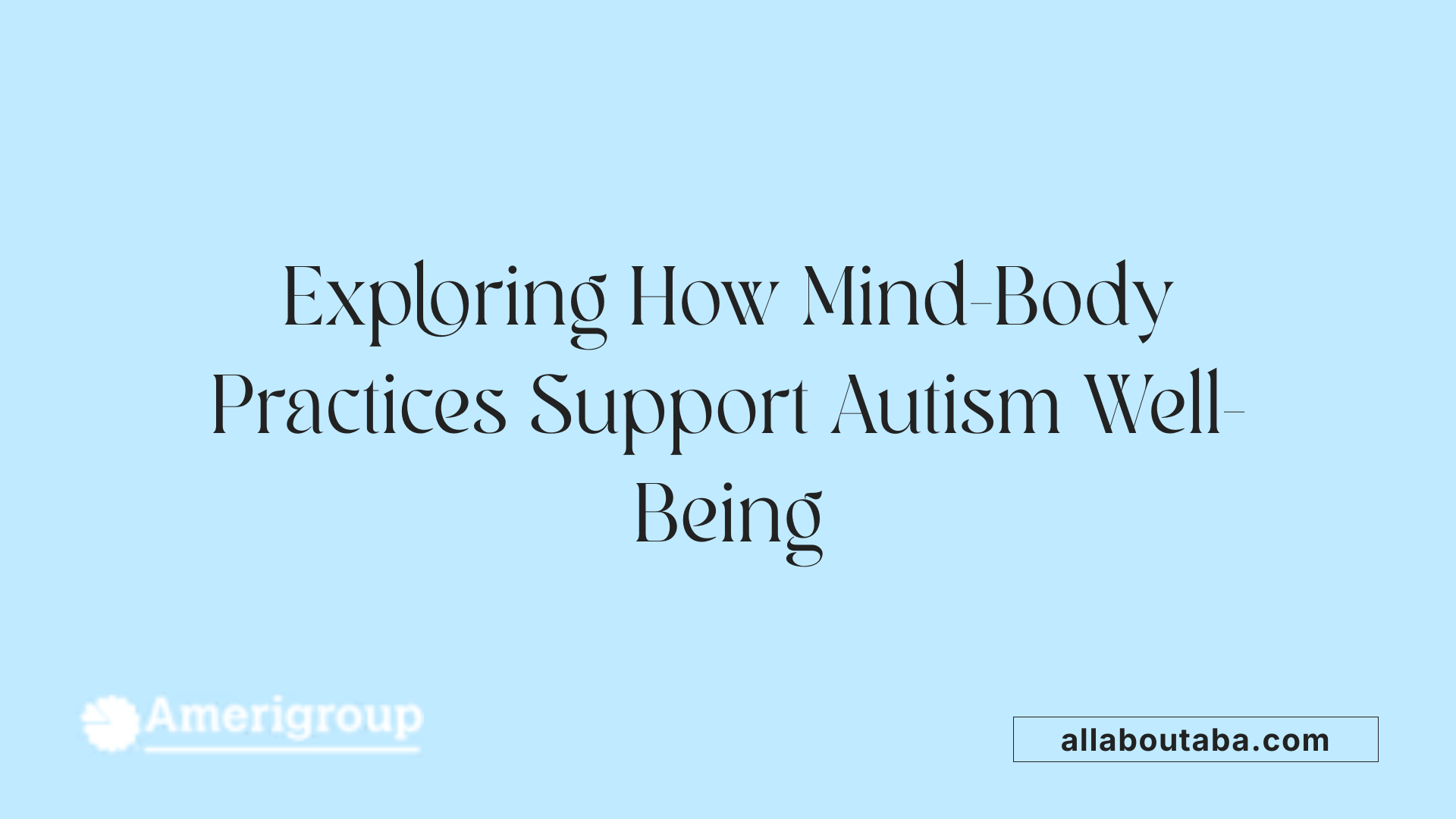 Mind–body therapies encompass a variety of practices including mindfulness, meditation, yoga, Nei Yang Gong, and acceptance commitment therapy. These approaches are increasingly used by individuals with autism spectrum disorder (ASD) to address behavioral issues, psychological symptoms, and enhance overall quality of life.
Mind–body therapies encompass a variety of practices including mindfulness, meditation, yoga, Nei Yang Gong, and acceptance commitment therapy. These approaches are increasingly used by individuals with autism spectrum disorder (ASD) to address behavioral issues, psychological symptoms, and enhance overall quality of life.
While the body of evidence supporting their effectiveness is limited, indicating only a few randomized controlled trials (RCTs), findings suggest promising outcomes. Many studies have reported improvements in mental health, such as reductions in anxiety, depression, and rumination, along with increased happiness and improved ability to manage thoughts in both children and adults with ASD.
Practitioners often adapt these interventions to better suit individuals with ASD. Adjustments include modifying language, extending session durations, and tailoring exercises to accommodate sensory sensitivities. Participants generally provide positive feedback, emphasizing the interventions' feasibility and acceptability.
One notable intervention is Mindfulness-Based Stress Reduction (MBSR), which has been adapted for autistic adults without intellectual disabilities. Conducted in outpatient settings with about 50 participants, this program demonstrated significant reductions in perceived stress and anxiety, as well as improvements in coping skills. Participants reported that MBSR was logical and likely to bring benefits, and many indicated they would recommend it to peers.
Preliminary results from studies like this show promising effects, including reduced symptoms of anxiety and depression, with no serious adverse events reported. These findings suggest that MBSR could be a safe, feasible approach worthy of further investigation through larger, well-designed randomized trials.
Similarly, mindfulness-based interventions (MBIs) have been shown to significantly reduce parental stress and psychological burden, improve parental mindfulness awareness, and alleviate anxiety and depression. Some research indicates potential benefits for children, including enhancements in social responsiveness. However, evidence for reducing problematic behaviors in children remains inconclusive.
Scientific explanations for how these practices influence well-being are emerging from neurobiological research. Activating areas like the anterior cingulate cortex (ACC) — involved in inhibitory control — Nei Yang Gong and similar therapies appear to enhance neural activity related to self-control. These interventions may regulate stress and emotional pathways, contributing to behavioral improvements.
Further, mental health benefits such as decreased anxiety, depression, and rumination might stem from modulating neural mechanisms involved in emotional regulation and cognitive processing. Though promising, most studies are small and uncontrolled, underscoring the importance of larger, rigorous trials.
| Therapy/Study Type | Main Findings | Limitations |
|---|---|---|
| Mindfulness (RCT in adults) | Significant reduction in depression, anxiety, rumination; effects maintained at follow-up | Small sample size; uncontrolled studies |
| MBSR in adults | Significant reductions in perceived stress and anxiety; improved coping; no adverse events | Further validation needed |
| MBIs for parents | Reduced parental stress and anxiety; improved mindfulness and well-being | Variability in study design; need for standardized measures |
| Autism-related disability | Significant improvements with MBSR post-intervention | Limited number of studies |
| Quality of life in adults | Significant improvements in QoL and ASD symptoms; some benefits maintained at follow-up | Evidence quality varies |
Scientific investigations continue to explore the neurobiological effects of these therapies. For example, practices like Nei Yang Gong have been associated with increased activity in the anterior cingulate cortex (ACC), a key brain region involved in emotional regulation and inhibitory control. Enhanced ACC activity correlates with better self-regulation, reducing behavioral issues common in ASD.
Research indicates that mindfulness and related practices influence neural pathways governing stress responses, emotional control, and cognitive functioning. This modulation may lead to decreased anxiety and hyperactivity, alongside improvements in mental health symptoms. These neuroadaptive mechanisms, however, require further elucidation through comprehensive, controlled studies.
In summary, although the current evidence base is limited, the existing research suggests that mind-body therapies are generally safe and feasible adaptations for people with ASD. The neurobiological basis, involving modulation of brain regions responsible for emotional and behavioral regulation, provides a promising avenue for understanding how these interventions may enhance well-being in individuals with autism.
Current Evidence and Limitations
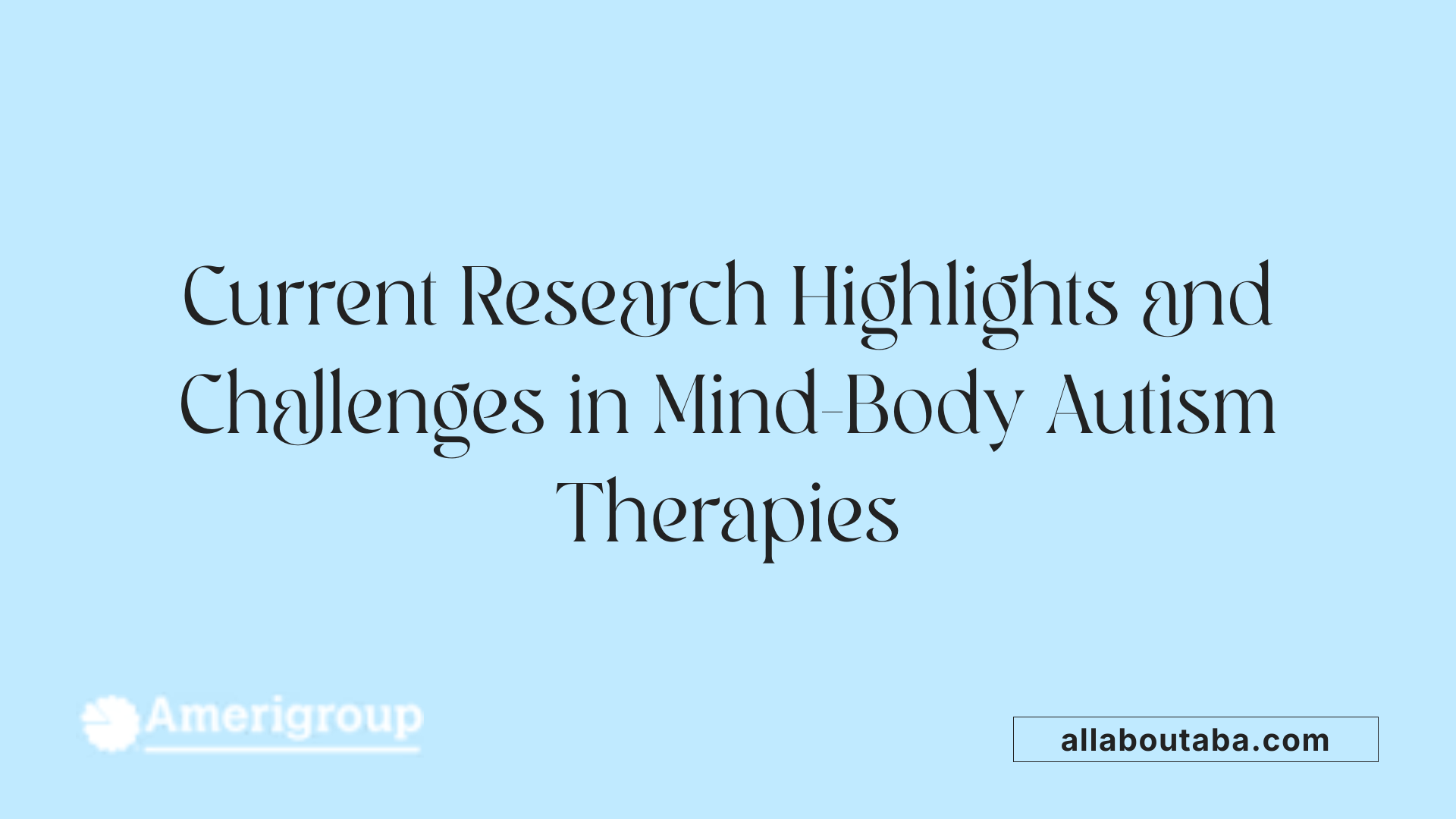
What is the scientific and clinical evidence supporting mind-body practices for stress management in autism?
There is a growing body of scientific and clinical research indicating that mind-body interventions can offer meaningful support for stress reduction in individuals with autism spectrum disorder (ASD). Studies have shown that practices such as mindfulness, mindfulness-based therapies like Mindfulness-Based Stress Reduction (MBSR), Nei Yang Gong, acceptance committing therapy, yoga, meditation, and relaxation techniques can lead to notable improvements. These include reductions in anxiety and depression, increased happiness, better thought regulation, and enhanced self-control.
For example, one randomized controlled trial (RCT) involving adults with ASD demonstrated that mindfulness therapy significantly improved symptoms of depression, anxiety, and rumination, with these benefits sustained over follow-up periods. Parents of children with ASD also experienced decreased stress levels and increased mindfulness after participating in mindfulness-based programs. Neurophysiological assessments, such as EEG recordings, suggest that these therapies may positively influence brain areas involved in emotion regulation, impulse control, and memory.
Despite promising findings, much of the current evidence stems from small-scale or uncontrolled studies. Many interventions have been adapted for ASD, modifying language, increasing session duration, and tailoring exercises to sensory sensitivities. These modifications have generally received positive feedback, indicating feasibility and acceptability.
However, the limited number of well-designed RCTs—only three to date—poses a challenge for drawing definitive conclusions. More extensive, rigorous studies are needed to confirm effectiveness, determine optimal intervention strategies, and understand long-term outcomes.
Are there systematic reviews and empirical support for using mind-body practices to address stress in autistic individuals?
Systematic reviews and empirical reports provide preliminary support for employing mind-body practices in managing stress within the ASD population. The evidence suggests that interventions like mindfulness, yoga, Nei Yang Gong, and acceptance strategies can help reduce psychological distress. For instance, mindfulness-based cognitive therapy (MBCT) and MBSR programs have been associated with decreased symptoms of anxiety and depression in adults with ASD.
Research also highlights benefits for caregivers; mindfulness-based interventions (MBIs) have been shown to significantly reduce parental stress and improve parental mindfulness awareness. Quantitative meta-analyses document moderate to large effects in reducing parental stress (standardized mean difference [SMD] = -0.69) and enhancing parental psychological resilience.
In children, some studies report improved social responsiveness post-intervention. However, evidence regarding reductions in problematic behaviors and emotional difficulties remains limited and inconsistent, with some measures not reaching statistical significance.
Most of these studies are small and employ varied methodologies, often lacking control groups or standardized outcome measures. Consequently, while initial findings are promising, the overall quality of evidence is considered low to moderate. Recent systematic reviews emphasize the necessity for better-powered, methodologically rigorous trials to establish clear efficacy. They also caution that more research is needed to understand the long-term benefits and identify which subgroups of individuals with ASD may gain the most from these practices.
Additional Insights
Research exploring physiological and neurophysiological mechanisms supports the potential of mind-body therapies to modify brain activity associated with emotion and behavior regulation. Ongoing investigations aim to specify these mechanisms further, strengthen the scientific foundation, and refine intervention protocols.
In summary, although current evidence underscores the feasibility and potential benefits of mind-body therapies in ASD, more comprehensive research with larger participant pools is needed. These therapies appear safe and accessible, and initial outcomes are encouraging, but clinicians should interpret findings cautiously until more definitive evidence is available.
Specific Mind-Body Techniques and Their Outcomes
How effective are mindfulness-based stress reduction (MBSR) and related techniques for individuals with autism?
Research indicates that mindfulness-based stress reduction (MBSR) and similar mindfulness techniques can play a significant role in improving mental health for individuals with autism, especially adults. Multiple studies have shown that these interventions help reduce symptoms of stress, anxiety, and depression. Participants often report feeling more capable of handling emotional challenges and managing their thoughts effectively.
In particular, MBSR has been adapted for autistic adults without intellectual disabilities, demonstrating promising results. In outpatient settings involving around 50 participants, the feasibility and acceptability of MBSR were confirmed. Participants found the program logical and likely to produce benefits, with many willing to recommend it to peers.
Outcomes in these studies often include notable decreases in perceived stress, with statistical significance (e.g., p<0.001) and moderate effect sizes. Alongside reduced stress, there was a marked improvement in coping skills, emotional regulation, and overall mental well-being. Some research points to sustained effects even after the completion of the program.
While the evidence supporting MBSR and related practices is encouraging, it is important to recognize limitations. Many studies involve small sample sizes and rely heavily on self-report data, which can introduce bias. Nonetheless, current findings suggest that mindfulness techniques are generally safe, feasible, and acceptable tools for helping manage psychological distress in autistic individuals.
Adaptation for adults without intellectual disability
To make these practices accessible, researchers have tailored mindfulness programs to cater to autistic adults without significant cognitive impairments. Adaptations include modifications in language for clarity, increasing session durations, and adjusting exercises to accommodate sensory sensitivities common in autism. Participant feedback has typically been positive, emphasizing the perceived logical nature of mindfulness and its potential benefits.
Feasibility, acceptability, outcomes
A study involving 50 autistic adults demonstrated that MBSR could be effectively integrated into outpatient care. The process was well-received, with participants indicating high acceptability. Measurements taken before and after interventions showed significant reductions in perceived stress levels, with average scores dropping substantially.
Outcomes also included reduction in symptoms of anxiety and depression, along with improved emotional regulation and coping strategies. No serious adverse events were reported, reinforcing the safety profile of these interventions.
Reductions in perceived stress, anxiety, depression
Quantitative data from various studies consistently showed reductions in stress, which is one of the main targets of MBSR. For example, perceived stress scores decreased significantly (p<0.001), with effect sizes indicating moderate impacts.
Similarly, symptoms of anxiety and depression saw marked declines following participation in mindfulness programs. These improvements were often maintained at follow-up assessments, suggesting lasting benefits.
Improved coping skills, well-being
Participants reported an increased ability to manage negative thoughts, emotional reactivity, and physical sensations. Measures of psychological well-being also rose, illustrating enhanced quality of life. These changes are aligned with the core goals of mindfulness practice—to foster acceptance, present-moment awareness, and curiosity toward one's experiences.
Overall, the accumulating evidence highlights that mindfulness-based therapies are promising approaches for supporting mental health in autistic populations. While further research is needed to confirm and expand these findings, current data suggest they are valuable tools for reducing psychological distress and improving daily functioning.
Impact on Stress and Mental Health Outcomes
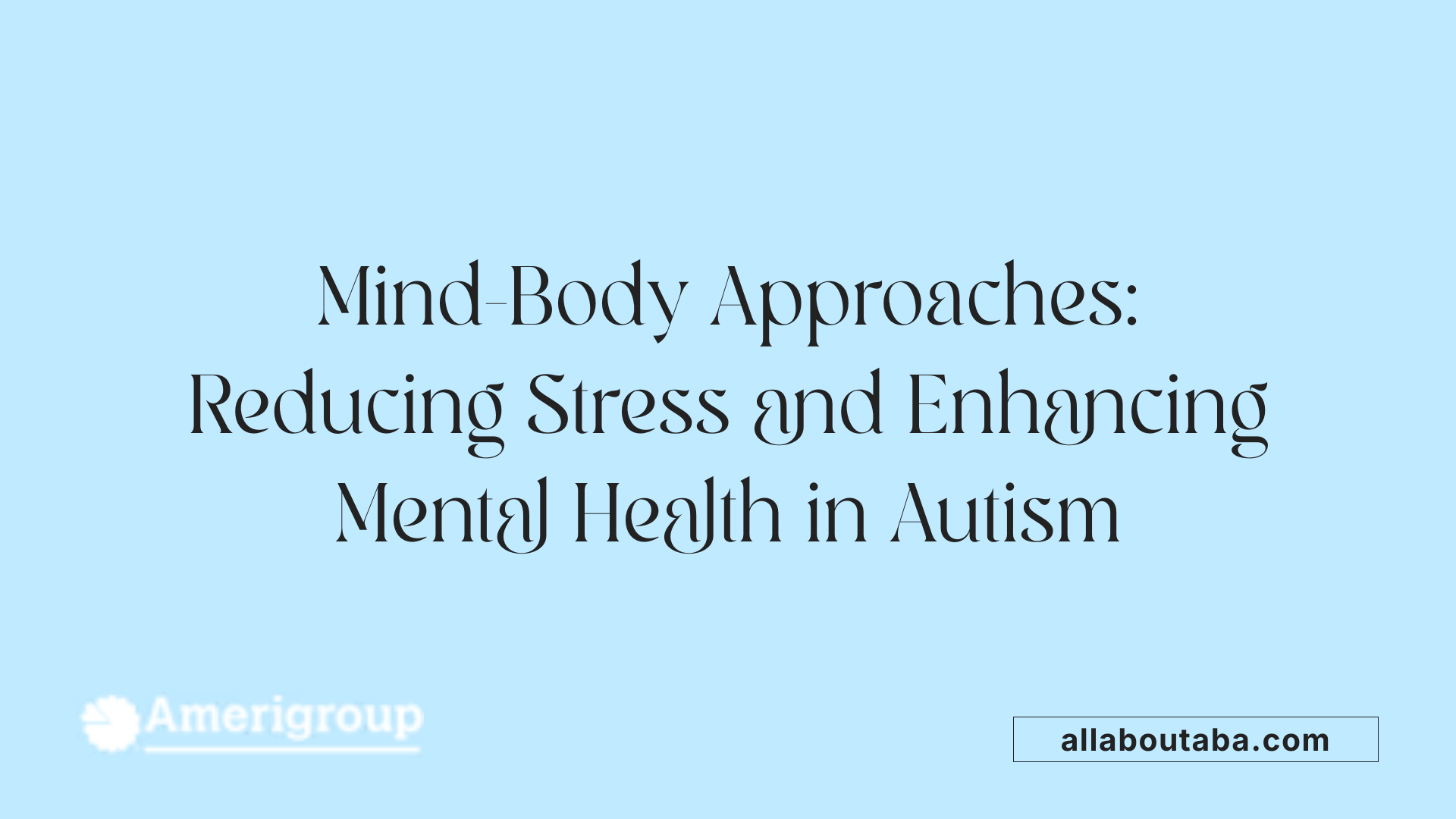
What are the outcomes and therapeutic effects of mind-body practices on stress, depression, and anxiety in individuals with autism?
Mind-body therapies such as mindfulness, yoga, Nei Yang Gong, and acceptance commitment therapy have gained popularity among individuals with autism spectrum disorder (ASD) for their potential to improve mental health. Multiple studies suggest they can help reduce symptoms of stress, depression, and anxiety, often leading to better emotional regulation.
In particular, mindfulness-based interventions like Mindfulness-Based Stress Reduction (MBSR) have demonstrated significant positive effects. For example, in adults with ASD, a trial showed that mindfulness therapy effectively decreased depression, anxiety, and rumination, with these benefits continuing during follow-up assessments.
Research indicates that these practices improve mental health by fostering acceptance of physical, mental, and emotional states and teaching individuals to manage their thoughts better. Such approaches can also reduce rumination and help individuals develop a curious, non-judgmental attitude toward their present experiences.
Parent-focused programs further enhance mental health outcomes. Mindfulness-based interventions for parents of children with autism significantly reduce parental stress and anxiety while increasing mindfulness awareness and psychological well-being. These improvements in parental mental health can indirectly benefit children, supporting overall family functioning.
While many studies report these encouraging outcomes, most are small or uncontrolled, limiting definitive conclusions. Nevertheless, the evidence suggests that mind-body therapies are generally safe, feasible, and potentially effective for improving mental health in both individuals with ASD and their caregivers.
What scientific and clinical evidence supports mind-body practices for stress management in autism?
The scientific landscape for mind-body therapies in autism is expanding. Systematic reviews of intervention studies involving people with ASD have identified several promising findings. For example, randomized controlled trials (RCTs) in adults with ASD have shown that MBSR can significantly reduce perceived stress and improve coping skills.
By measuring physiological and psychological changes, studies provide evidence that these therapies influence brain activity related to self-control and emotional regulation. Neurophysiological assessments, including EEG, have reported modifications in brain function following mindfulness training.
Clinical studies show medium to large effect sizes in reducing anxiety and depression symptoms. For instance, improvements in ASD-related behaviors and psychiatric symptoms have been observed after adapted mindfulness and relaxation techniques, often with benefits sustained over several months.
Despite these positive findings, many existing studies face limitations such as small sample sizes, lack of control groups, or variability in intervention protocols. Nonetheless, their collective findings support the inclusion of mind-body practices as safe, accessible options to manage stress and improve mental health in autism.
Summarized Outcomes and Future Directions
| Therapy Type | Population | Main Outcomes | Evidence Certainty | Notable Findings |
|---|---|---|---|---|
| Mindfulness | Adults with ASD | Reduced stress, anxiety, depression | Moderate | Significant reductions post-intervention |
| MBIs (Parent-focused) | Parents of children with ASD | Reduced parental stress, improved mindfulness awareness | Low to moderate | Parental well-being enhances child outcomes |
| Adapted Relaxation Techniques | Children and adults | Behavior, emotional regulation | Limited | Supporting evidence, needs further confirmation |
Scientific research continues to grow, emphasizing the importance of high-quality, controlled studies to establish definitive benefits and optimal intervention protocols. As evidence accumulates, mind-body practices are poised to become integral components of comprehensive autism care, supporting mental health and overall well-being for individuals and their families.
Psychological and Social Benefits
What are the outcomes and therapeutic effects of mind-body practices on stress, depression, and anxiety in individuals with autism?
Mind–body therapies such as mindfulness, meditation, yoga, Nei Yang Gong, and acceptance commitment therapy are increasingly used to support individuals with autism spectrum disorder (ASD). Current research suggests these approaches can lead to notable improvements in mental health, including reductions in stress, depression, and anxiety.
Studies both in children and adults demonstrate that mindfulness and related techniques can enhance emotional regulation and foster a greater sense of acceptance. For example, mindfulness-based stress reduction (MBSR) tailored for autistic adults has shown promising results, with significant decreases in perceived stress, anxiety, and depressive symptoms. Participants report feeling more capable of coping with daily challenges, and benefits may endure over follow-up periods.
Parental involvement has also been highlighted, as mindfulness-based interventions significantly reduce stress in parents of children with ASD. These parents experience fewer feelings of anxiety and depression, contributing to improved overall well-being. Such improvements in parental mental health often positively impact the child's behavioral outcomes, creating a beneficial cycle.
While evidence is promising, most existing studies are limited by small sample sizes, uncontrolled designs, and varied intervention protocols. Nevertheless, the overall safety profile of these therapies is strong, with no serious adverse events reported. They are generally considered feasible and acceptable, especially when interventions are adapted for sensory sensitivities and language needs.
In summary, mind-body practices hold considerable potential for reducing psychological distress and enhancing emotional well-being in individuals with ASD and their families. As research progresses, larger, high-quality controlled trials are needed to establish their effectiveness definitively.
How do mind–body therapies improve quality of life for individuals with ASD?
Empirical evidence indicates that therapies like MBSR can improve various aspects of life quality, including mood, social engagement, and coping skills. Some studies report significant gains in mental health scores and reductions in core ASD symptoms when these therapies are included in treatment plans.
Quality-of-life improvements are typically associated with better stress management, increased social responsiveness, and reduced behavioral difficulties. Moreover, these interventions often promote acceptance of sensory and emotional experiences, fostering resilience.
Do these therapies influence social responsiveness and problematic behaviors in children?
Research focusing on children with ASD suggests that mindfulness and related practices can lead to improvements in social responsiveness. Though findings are preliminary, studies report moderate effects with participants showing enhanced ability to engage in social interactions.
Regarding problematic behaviors, some studies observed reductions post-intervention, yet results vary. While some improvements are noted, the evidence is less robust, and further research is necessary to confirm these effects and determine long-term sustainability.
What is the impact of mind–body therapies on parental well-being?
Parents of children with ASD often experience heightened levels of stress, anxiety, and depression. Mindfulness-based interventions have demonstrated significant benefits in these areas, reducing parental psychological distress.
For example, in studies involving parents who participated in mindfulness programs, reductions in perceived stress and anxiety were statistically significant. They also reported increased mindfulness awareness and greater psychological well-being.
These improvements can help parents better manage daily caregiving challenges, enhance their mental health, and foster more positive family dynamics.
| Aspect | Outcomes/Effects | Evidence/Notes |
|---|---|---|
| Reduction in stress, anxiety, depression | Significant decreases in symptoms | Studies report p-values < 0.05, with some effects maintained at follow-up |
| Improvement in social responsiveness | Moderate positive effects | Limited but promising evidence, particularly in children |
| Problematic behaviors in children | Partial reduction; evidence varies | Not enough consistent data; further studies needed |
| Parental psychological health | Significant improvements | Reduced stress and anxiety, increased well-being, supported by multiple studies |
Overall, existing studies underscore the safety and feasibility of these approaches, advocating for larger, more rigorous trials to confirm benefits. As awareness grows, practitioners increasingly incorporate mindfulness, meditation, and adaptive mind-body techniques as complementary strategies for enhancing the lives of individuals with ASD and their families.
Role of Adaptations and Personalized Approaches
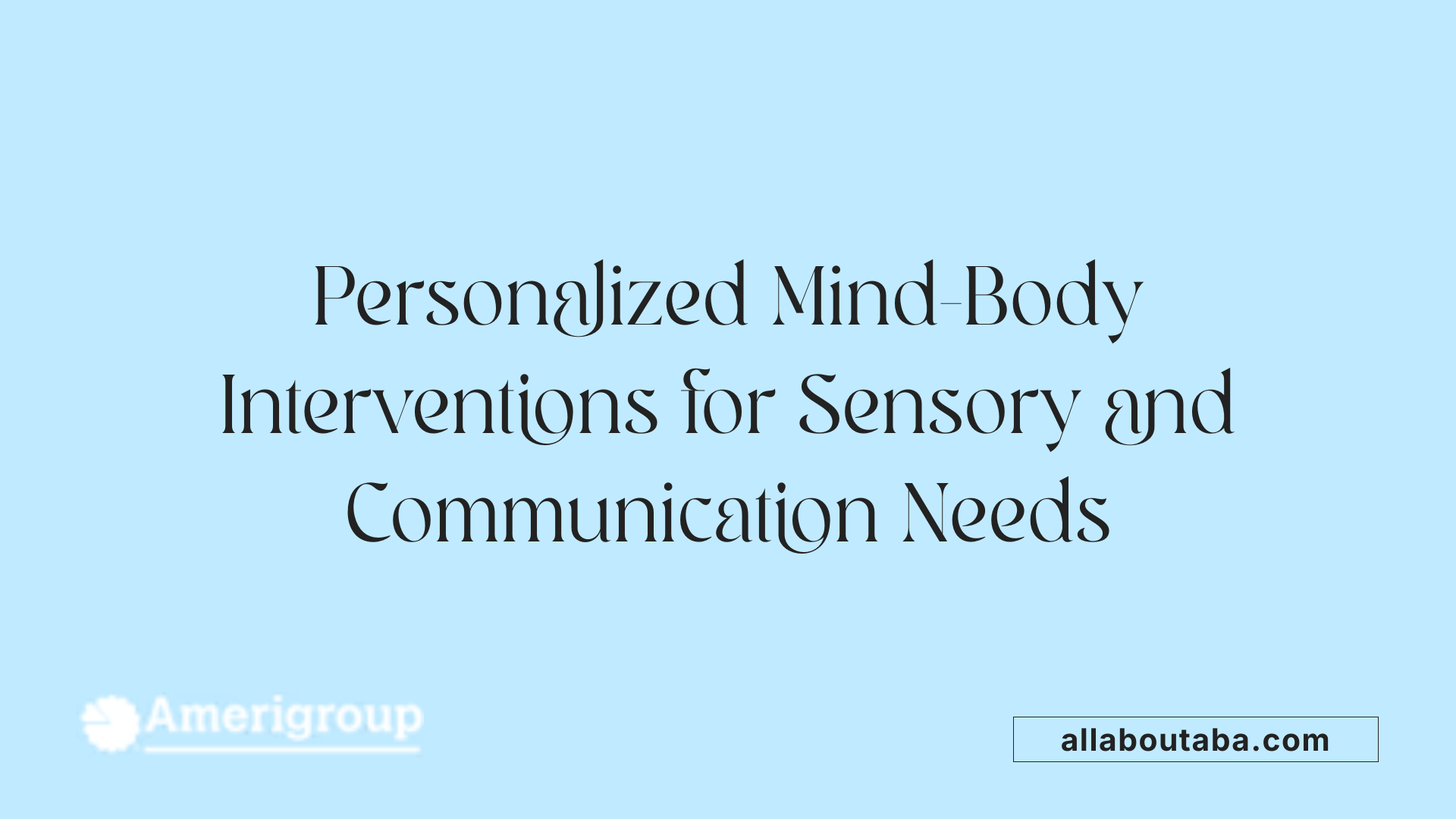
Customizing interventions for sensory sensitivities
When applying mind–body therapies to individuals with autism spectrum disorder (ASD), personalization is essential. Many participants experience sensory sensitivities that can make standard techniques overwhelming or uncomfortable. To address this, practitioners often adapt exercises by modifying sensory input. For example, they might select softer lighting, reduce background noise, or use calming tactile stimuli.
Adjustments like these help create a more comfortable environment, allowing participants to engage more fully with practices such as meditation, yoga, or Nei Yang Gong. Tailoring sensory elements ensures that interventions are accessible and sustainable, encouraging longer-term practice and greater potential benefits.
Modifying language and duration
Language modifications are also crucial since communication styles and comprehension levels vary widely in the ASD population. Instruction is often simplified or clarified to align with individual linguistic capacities. If necessary, visual aids or demonstrations supplement verbal directions, ensuring participants understand and can perform exercises correctly.
Duration of sessions is another aspect of adaptation. While standard mindfulness or yoga classes might last 60 minutes, shorter or divided sessions are frequently used for children or less tolerant individuals. Increasing or decreasing session length based on participant response and attention span optimizes engagement and reduces fatigue.
Participant feedback and engagement
Participant feedback plays a vital role in refining these therapies. Many studies report positive responses when exercises are tailored to individual preferences and needs. Participants often describe feeling more comfortable and motivated when their input influences program design. This participatory approach fosters a sense of control and ownership, which is especially beneficial in populations with ASD.
In practice, clinicians regularly gather feedback through surveys, verbal check-ins, or behavioral observations. Adjustments are then made to improve the fit and effectiveness of interventions. Overall, personalized strategies not only enhance safety but also promote adherence, ultimately contributing to more meaningful outcomes.
Parents and Caregivers: Their Role and Benefits
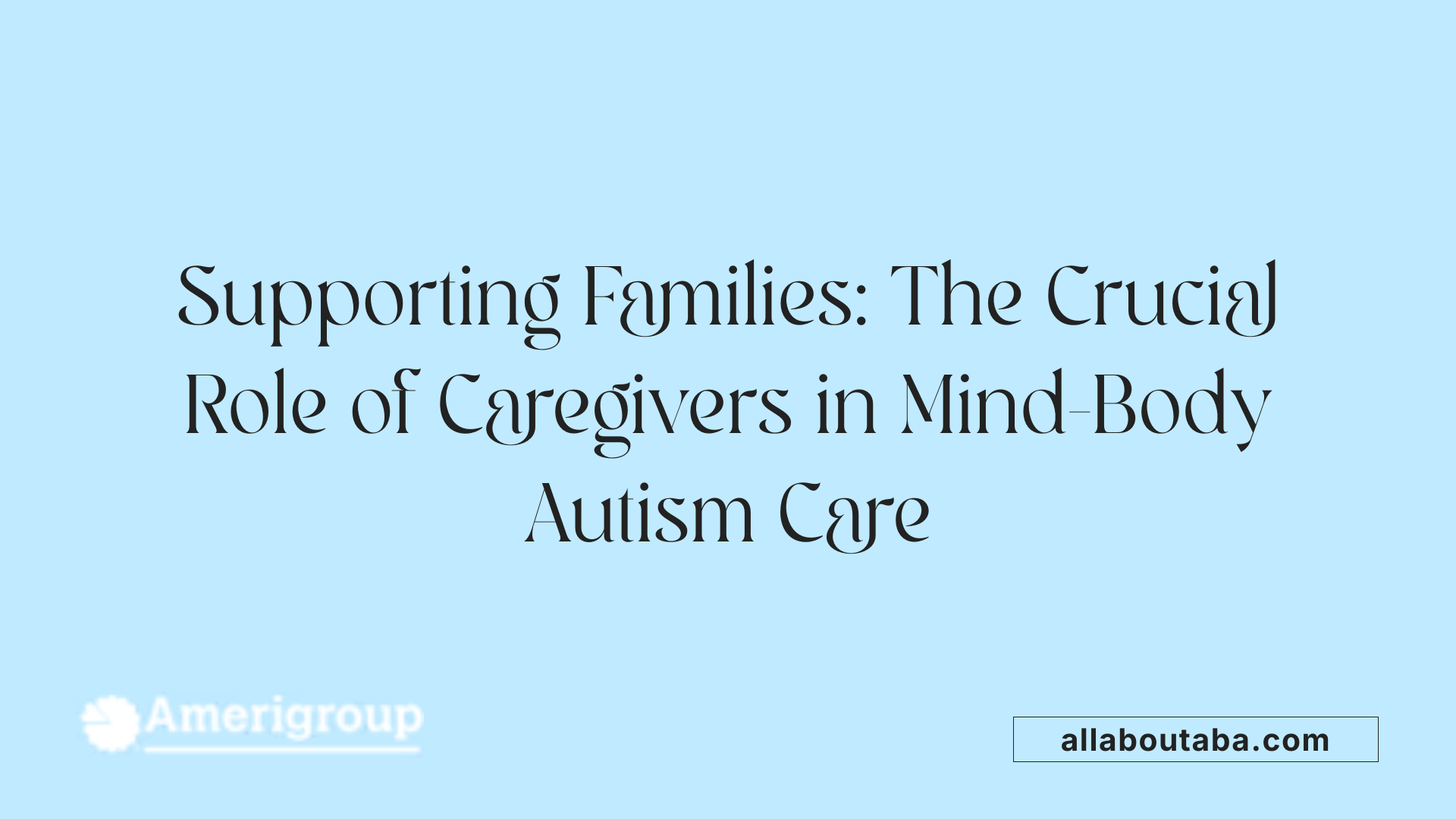
How does scientific and clinical evidence support mind-body practices for stress management in autism?
Emerging research increasingly indicates that mind-body techniques can be beneficial for managing stress in individuals with autism spectrum disorder (ASD) and their families. Several systematic reviews have analyzed studies involving mindfulness, mindfulness-based therapies, Nei Yang Gong, and tailored relaxation methods. These studies suggest that such interventions can improve psychological symptoms, reduce behavioral issues, and boost self-regulation, anxiety, and depression among children and adults with ASD.
While many studies are small or uncontrolled, some randomized controlled trials (RCTs) provide stronger evidence. For example, RCTs involving adults with ASD show significant positive effects, including enhanced emotion regulation and self-control. Neurophysiological assessments, like EEG, indicate that these practices may influence brain activity associated with memory, attention, and emotional regulation.
Despite promising findings, the evidence base faces limitations due to variability in study design, small sample sizes, and adaptive modifications. The current evidence, though not definitive, supports the potential role of mind-body therapies in stress management. Experts agree that larger, well-controlled studies are necessary to confirm benefits, refine intervention strategies, and tailor approaches specific to ASD subgroups.
Future Directions and Research Needs
What is the scientific and clinical evidence supporting mind-body practices for stress management in autism?
Current evidence suggests that mind–body therapies may offer promising benefits for individuals with autism spectrum disorder (ASD). Research findings include improvements in psychological well-being, reductions in stress, anxiety, and depression, and positive effects on behavioral symptoms. Systematic reviews of available studies highlight that interventions such as mindfulness-based therapies, Nei Yang Gong, yoga, and relaxation techniques can be adapted to meet the sensory and communication needs of those with ASD.
Although many studies show potential, much of the existing research is limited by small sample sizes, uncontrolled designs, and varied interventions. Some randomized controlled trials (RCTs) report moderate to large effects, especially in adults with ASD and in parent-focused programs. Neurophysiological assessments, like EEG studies, suggest that these practices may modulate brain activity associated with emotion regulation and cognitive control.
Despite encouraging findings, scientific evidence remains preliminary. The consistent use of adapted methods and the generally favorable safety profiles support further exploration. However, the variability in study designs and outcomes underscores the need for more rigorous research to confirm efficacy and determine optimal approaches.
Need for large-scale, well-controlled studies
To validate the benefits observed, more extensive research is essential. Large-scale, randomized, controlled trials with sufficient statistical power are needed to establish causality and assess long-term effects. Proper control groups, blinding, and standardized interventions will improve reliability. These studies should also investigate how factors like age, severity of ASD, sensory sensitivities, and co-occurring conditions influence outcomes.
Standardized outcome measures
A significant challenge in the current research landscape is the heterogeneity of outcome measures. Developing and adopting standardized, validated scales for psychological symptoms, behavioral improvements, and quality of life will facilitate comparisons across studies. Consistent outcome measures are crucial for meta-analyses and for translating research findings into clinical practice.
Long-term follow-up studies
Most existing studies focus on short-term outcomes. To understand the sustainability of benefits, future research must include long-term follow-up assessments. This will clarify whether improvements in mental health, behavioral symptoms, and well-being are maintained over time, and how ongoing or booster interventions might support long-lasting gains.
Potential for personalized interventions
Given the diversity within ASD, personalized approaches tailored to individual sensory profiles, cognitive abilities, and specific needs could enhance effectiveness. Future research should explore how to customize mind–body therapies for subgroups of individuals, potentially integrating assessments of neurophysiological markers and behavioral profiles. The goal is to develop flexible, scalable programs that can be adapted for different age groups, symptom profiles, and cultural contexts.
| Aspect | Current Status | Future Directions | Impact of Research |
|---|---|---|---|
| Evidence Base | Limited, small studies | Larger, controlled trials | Increased reliability |
| Standardization | Variable measures | Develop and validate scales | Better comparability |
| Long-term Effects | Understudied | Longitudinal assessments | Understanding sustainability |
| Personalization | Limited | Tailored intervention models | Enhanced individual outcomes |
| Implementation | Feasibility/acceptance | Cultural and contextual adaptation | Broader clinical use |
In sum, while initial evidence supports the promise of mind–body therapies in ASD, advancing research through rigorous, standardized, and personalized studies is crucial. These efforts will help to establish them as evidence-based options for managing stress and improving quality of life in individuals with autism.
Summary and Final Thoughts
What are the outcomes and therapeutic effects of mind-body practices on stress, depression, and anxiety in individuals with autism?
Research indicates that mind-body therapies such as mindfulness, yoga, acceptance commitment therapy, Nei Yang Gong, and biofeedback can have positive impacts on managing stress, depression, and anxiety among people with autism spectrum disorder (ASD). Several studies report improvements in mental health symptoms, emotional regulation, and overall quality of life in both children and adults.
For example, mindfulness-based stress reduction (MBSR) tailored for autistic adults has demonstrated significant benefits. Participants in MBSR interventions experienced reductions in perceived stress, anxiety, and depression, with some effects sustaining over follow-up periods. Similar positive outcomes were observed in parents of children with ASD, where mindfulness interventions reduced parental stress and enhanced mindfulness awareness.
These therapies typically help individuals accept and regulate their physical, mental, and emotional states, fostering a curious, non-judgmental attitude towards their present-moment experiences. This acceptance can contribute to better emotional regulation and decreased rumination, which are often heightened in individuals with ASD.
While current evidence points toward the safety and feasibility of these interventions, many studies remain preliminary, characterized by small sample sizes and uncontrolled designs. Nonetheless, the overall trend suggests that mind-body approaches can be valuable adjuncts in managing psychological symptoms in ASD.
Implications for clinical practice
Given the promising outcomes and generally safe profile, clinicians working with individuals with ASD should consider incorporating mind-body therapies into comprehensive treatment plans. Tailoring interventions to suit the sensory sensitivities and communication needs of individuals enhances engagement and effectiveness.
For adults with ASD, particularly those without intellectual disabilities, adapted mindfulness programs such as MBSR can be introduced to facilitate stress management and emotional regulation.
In parent training and family-based interventions, mindfulness practices can alleviate caregiver stress, improve parental mental health, and potentially lead to positive behavioral changes in children.
Practitioners should note that while emerging evidence supports these practices, rigorous, larger-scale controlled trials are necessary to establish definitive therapeutic protocols and outcome expectations.
Recommendations for future research
To strengthen the evidence base, future research must focus on conducting large, high-quality randomized controlled trials with standardized outcome measures. Studies should aim to:
- Confirm the long-term efficacy and safety of various mind-body therapies in diverse ASD populations.
- Explore which specific interventions or components (e.g., meditation, yoga, acceptance exercises) are most beneficial.
- Understand the mechanisms underpinning therapeutic effects, such as changes in neurobiological or emotional regulation pathways.
- Investigate the impact of these therapies on broader aspects like social responsiveness, behavioral difficulties, and parental well-being.
- Consider developing age-appropriate, culturally sensitive adaptations to maximize engagement across different populations.
Such comprehensive research efforts will support the integration of mind-body therapies into evidence-based practice for ASD, ultimately improving outcomes for individuals and families affected by this condition.
Bridging Science and Practice in Autism Care
Although research into mind-body practices for autism remains in its early stages, existing studies suggest promising avenues for reducing stress and improving overall mental health. Continued efforts to design larger, more rigorous trials will be essential to validate these interventions, optimize protocols, and integrate them into comprehensive autism care approaches. As evidence accumulates, mindfulness-based and other mind-body practices could become vital, accessible components of personalized strategies aimed at enhancing the resilience, emotional regulation, and quality of life for individuals with autism and their families.
References
- Autism and Mind–Body Therapies: A Systematic Review
- Mindfulness-based stress reduction for autistic adults
- The effectiveness of mindfulness-based interventions for ...
- Early Reflections on the Therapeutic Effects of Mindfulness ...
- Mindfulness-Based Stress Reduction in the Treatment of ...
- Mindfulness-Based Interventions for People with Autism ...
- Mindfulness and ASD
- Effect of Mindfulness-Based Stress Reduction Occupational...







